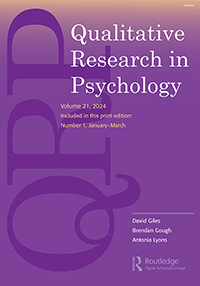Special issue introduction – working towards allyship: acknowledging and redressing power imbalances in psychology
IF 4.4
3区 心理学
Q1 PSYCHOLOGY, MULTIDISCIPLINARY
引用次数: 5
Abstract
ABSTRACT In this special issue, we create space to discuss and extend on conceptualisation, theorisation, and practice of allyship in qualitative psychology research. Allyship can be defined broadly as a way of redressing power imbalances between privileged and marginalised groups and individuals and is thus strongly aligned with qualitative methods founded on social justice. The discipline of psychology, in contrast, has traditionally contributed to oppression of people considered not White, not heterosexual, not male, disabled, poor, not sane, and/or Indigenous. The contributions in this special issue consider the role of psychology in redressing this oppression. In this introduction to the special issue, we explore some of the common threads across these contributions, namely the ways in which power and control, relationships, and intersectionality and diversity relate to research involving allyship. Overall, the work presented in this special issue furthers knowledge and innovation in allyship and the particular place of allyship in qualitative research within psychology and beyond.特刊导言-努力建立同盟关系:承认和纠正心理学中的权力不平衡
摘要在这期特刊中,我们创造了空间来讨论和扩展定性心理学研究中盟友关系的概念化、理论化和实践。盟友关系可以被广泛定义为一种纠正特权和边缘化群体和个人之间权力失衡的方式,因此与建立在社会正义基础上的定性方法紧密一致。相比之下,心理学传统上助长了对非白人、非异性恋、非男性、残疾人、穷人、心智不健全和/或土著人的压迫。本期特刊的贡献考虑了心理学在纠正这种压迫中的作用。在这期特刊的引言中,我们探讨了这些贡献的一些共同点,即权力和控制、关系、交叉性和多样性与涉及盟友关系的研究之间的关系。总的来说,本期特刊中的工作进一步加深了盟友关系的知识和创新,以及盟友关系在心理学内外的定性研究中的特殊地位。
本文章由计算机程序翻译,如有差异,请以英文原文为准。
求助全文
约1分钟内获得全文
求助全文
来源期刊

Qualitative Research in Psychology
PSYCHOLOGY, MULTIDISCIPLINARY-
CiteScore
20.00
自引率
0.50%
发文量
14
期刊介绍:
Qualitative Research in Psychology is an international, peer-reviewed journal that publishes high-quality, original research. It aims to become the primary forum for qualitative researchers in all areas of psychology, including cognitive, social, developmental, educational, clinical, health, and forensic psychology. The journal also welcomes psychologically relevant qualitative research from other disciplines. It seeks innovative and pioneering work that advances the field of qualitative research in psychology.
The journal has published state-of-the-art debates on various research approaches, methods, and analytic techniques, such as discourse analysis, interpretative phenomenological analysis, visual analyses, and online research. It has also explored the role of qualitative research in fields like psychosocial studies and feminist psychology. Additionally, the journal has provided informative articles on ethics, transcription, interviewee recruitment, and has introduced innovative research techniques like photovoice, autoethnography, template analysis, and psychogeography.
While the predominant audience consists of psychology professionals using qualitative research methods in academic, clinical, or occupational settings, the journal has an interdisciplinary focus. It aims to raise awareness of psychology as a social science that encompasses various qualitative approaches.
In summary, Qualitative Research in Psychology is a leading forum for qualitative researchers in psychology. It publishes cutting-edge research, explores different research approaches and techniques, and encourages interdisciplinary collaboration.
 求助内容:
求助内容: 应助结果提醒方式:
应助结果提醒方式:


